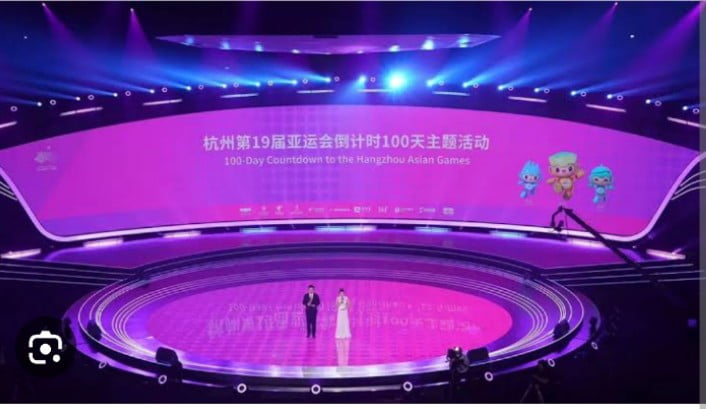In a resounding declaration, organizers have announced that a staggering assemblage of 12,417 athletes hailing from 45 Asian countries and regions are poised to compete in the eminent Hangzhou Asian Games. Set to unfurl its spectacle from September 23 to October 8 in Hangzhou, the capital of East China’s Zhejiang Province, this heralds the third incarnation of this grand Asian multi-sport event on Chinese soil, following the 1990 Beijing Asian Games and the 2010 Guangzhou Asian Games.
Since ticket sales kicked off on July 8, anticipation has surged, with keen interest witnessed in events such as swimming and e-sports. Ticket prices, ranging from 20 to 1,000 yuan ($2.75 to $137), present an accessible gamut for spectators, with a majority exceeding 60% priced under 100 yuan, organizers revealed.
Symbolizing the countdown, the torch relay will embark on its journey on September 8 in Hangzhou, eventually traversing the province of Zhejiang until September 20, as conveyed by Chen Weiqiang, the executive secretary general of the Hangzhou Asian Games organizing committee.
Dynamic scheduling adjustments have been instituted based on athletes’ registrations, culminating in a meticulously refined race schedule to be unveiled at the close of August, asserted Zhu Qinan, the director of the Sports Department within the organizing committee.
Dawning as a hallmark of this edition, the Hangzhou Asian Games will introduce burgeoning sports captivating the youth, such as break dance and e-sports.
Furthermore, Weiqi, a cerebral sport, will make a triumphant return to the Hangzhou Games, reemerging after a 13-year hiatus since its appearance at the 2010 Guangzhou Games.
Noteworthy regional sports intrinsic to Asia, including dragon boat racing, kurash, and sepak takraw, though not sanctioned as Olympic disciplines, will adorn the podiums as medal-worthy events at this revered Asian Games.
China’s robust delegation, poised to exceed 900 athletes, anticipates consolidating its athletic supremacy. Since 1982, China has consistently occupied the zenith of the medal tally in every Asian Games it has partaken in.
As China braces for spirited competition, other Asian giants, Japan and South Korea, stand poised as formidable contenders, consistently clinching second and third spots on the medal leaderboard, owing to their dominance in swimming and archery, respectively.
In a bid to challenge China’s ascendancy in shooting, India has been fervently enhancing its shooting contingent, contributing to the heightened anticipation and fervor surrounding the Hangzhou Asian Games.
Preceding the commencement, the design intricacies of the victory ceremony elements, encompassing bouquets, trays, and podiums, have been unveiled. An official theme song, “The Love We Share,” performed by renowned Chinese vocalist Sun Nan, has been endorsed, resonating with the unifying spirit of diverse people from various regions across Asia.
This epochal sporting extravaganza, with its confluence of athletic prowess, cultural symbolism, and unifying themes, is poised to grace Hangzhou, heralding the dawn of Asia’s paramount multi-sport event.







